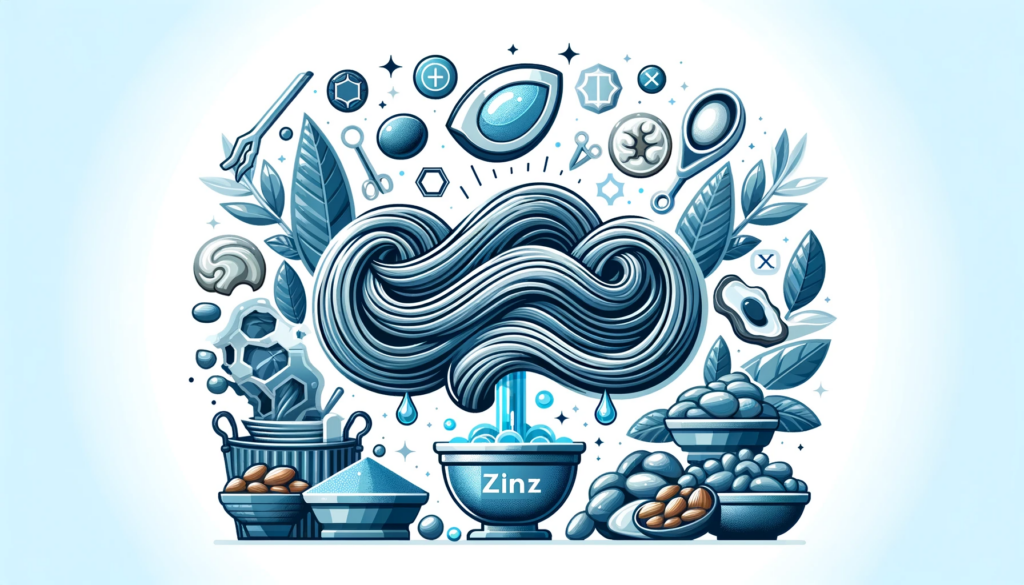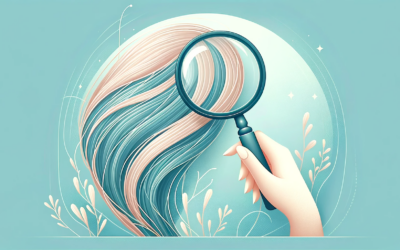Nourishing Locks: Understanding Vitamin Deficiencies and Hair Loss in Women Over 40
Introduction
 As we cross the threshold of 40, our bodies begin to narrate different stories, and for many women, one such story is that of changing hair health.
As we cross the threshold of 40, our bodies begin to narrate different stories, and for many women, one such story is that of changing hair health.
Hair, often seen as a symbol of vitality and youth, can be significantly affected by our nutritional intake, particularly the presence or absence of certain vitamins.
Understanding the intricate link between vitamin deficiencies and hair health is crucial, especially as we navigate the complexities of our forties and beyond. In this post, we’ll explore the vital vitamins that play a starring role in maintaining luscious, healthy hair and what happens when we fall short on them.
Vitamin B Complex and Hair Health

Vitamin B complex is like a symphony orchestra for hair growth, with each vitamin playing a crucial role in the overall health of your tresses.
Biotin (B7), Riboflavin (B2), and Folate (B9) are standouts in this group. Biotin is celebrated for its direct role in hair growth, supporting healthy and robust hair.
Vitamin B12, on the other hand, boosts the production of red blood cells, providing oxygen to hair follicles, which is vital for hair growth and strength.
A diet rich in B-vitamins is akin to providing premium fuel for your hair. Incorporate foods like meat, poultry, fish, dairy products, grains, and a variety of vegetables like spinach and broccoli into your daily meals.
Nuts, seeds, beans, lentils, avocados, and bananas are also excellent sources of these hair-nourishing vitamins. Embracing a diet that’s rich in B-vitamins can be a game-changer for your hair, offering a natural route to enhance its vitality and shine.
The Role of Zinc in Hair Growth
 Zinc is like the building block of hair growth, playing a pivotal role in the production of proteins vital for healthy hair. A deficiency in zinc can manifest in more ways than one, including hair loss, a diminished sense of taste or smell, and slow wound healing.
Zinc is like the building block of hair growth, playing a pivotal role in the production of proteins vital for healthy hair. A deficiency in zinc can manifest in more ways than one, including hair loss, a diminished sense of taste or smell, and slow wound healing.
It’s a clear signal that zinc is an indispensable mineral for not just your hair but overall health.
To ensure you’re getting enough zinc, integrate a variety of zinc-rich foods into your diet. These include shellfish, beans, meat, nuts, and seeds.
Remember, balance is key – both deficiency and excess of zinc can lead to hair loss. For those looking to supplement, zinc liquid drops can be an efficient way to meet daily requirements.
Selenium: A Trace Mineral for Hair

Selenium, though needed in small amounts, plays a significant role in maintaining healthy hair.
It’s involved in the synthesis of over 35 proteins and offers several benefits for hair, including its anti-fungal properties that help combat dandruff-causing fungus.
It also contributes to the production of thyroid hormones, which are critical for hair growth, and neutralizes free radicals, protecting hair follicles from damage.
Incorporating selenium-rich foods into your diet, such as Brazil nuts, fish, and meats, can boost your hair health. As with any nutrient, moderation is key since both deficiency and excess can affect hair health.
Vitamin E: Antioxidant for Hair Protection

Vitamin E is renowned for its antioxidant properties, playing a key role in hair health and scalp protection. It combats the harm caused by free radicals, thus preventing hair loss.
Vitamin E also improves scalp circulation and forms a protective barrier, contributing to healthier hair.
Incorporating Vitamin E-rich foods like vegetable oils, nuts, seeds, and leafy greens into your diet can significantly benefit your hair, enhancing its gloss and preventing damage.
Consider this vitamin a guardian angel for your locks, safeguarding them against external stressors while boosting their natural shine and strength.
Vitamin C: More Than Just Immunity
 Vitamin C is a powerhouse when it comes to hair health. Famed for its strong antioxidant qualities, it plays a critical role in reducing hair aging and promoting robust hair growth.
Vitamin C is a powerhouse when it comes to hair health. Famed for its strong antioxidant qualities, it plays a critical role in reducing hair aging and promoting robust hair growth.
It aids in the production of collagen, an essential protein that helps prevent thinning and contributes to hair strength.
To boost your Vitamin C levels, incorporate citrus fruits, broccoli, and cauliflower into your diet.
These natural sources not only support your immune system but also provide your hair with the nutrients it needs to stay healthy and vibrant.
Vitamin A and Hair Growth
 Vitamin A is essential for all cells’ growth, including hair, the fastest-growing tissue in the human body. Its deficiency can lead to several problems, including hair loss.
Vitamin A is essential for all cells’ growth, including hair, the fastest-growing tissue in the human body. Its deficiency can lead to several problems, including hair loss.
Foods rich in beta-carotene, which is converted into vitamin A in the body, are crucial.
These include sweet potatoes, pumpkins, and spinach, which not only support overall health but also contribute to healthy hair growth.
Incorporating these vitamin A-rich foods into your diet can help maintain healthy hair and prevent the issues associated with deficiency.
Calcium: Not Just for Bones
While calcium is widely known for its crucial role in bone health, its importance in hair health is often overlooked.
A deficiency in calcium can lead to brittle nails and hair, with hair becoming thinner and more prone to falling out.
Including calcium-rich foods in your diet, such as dairy products, leafy greens, and fortified foods, is essential to maintain the strength and health of your hair.
Iron: Essential for Healthy Hair
 Iron plays a pivotal role in maintaining healthy hair. It aids in carrying oxygen to the cells, including those of the hair follicles, facilitating healthy hair growth.
Iron plays a pivotal role in maintaining healthy hair. It aids in carrying oxygen to the cells, including those of the hair follicles, facilitating healthy hair growth.
Iron deficiency can lead to symptoms like anemia, exhaustion, and notably, hair loss. Including iron-rich foods in your diet, such as red meat, pork, poultry, beans, and seafood, is crucial.
For vegetarians, options like lentils, cashew nuts, dried apricots, and figs are excellent alternatives.
Essential Fatty Acids and Hair Health
Essential fatty acids, particularly Omega-3, are crucial for maintaining a healthy scalp and hair.
They regulate the body’s natural functions, activate hair growth, and provide strength to the follicles. Omega-3 also helps prevent inflammation around the hair follicles, which can lead to hair loss.
The primary source of Omega-3 is fatty fish, but for those who don’t consume fish, flaxseeds and chia seeds are excellent alternatives. Supplementing with Omega-3 capsules can also be beneficial.
Manganese and Magnesium: Supporting Hair Health
Manganese is responsible for producing antioxidant enzymes that protect hair from damage by free radicals, preventing thinning and brittleness.
Rich sources of manganese include strawberries, whole grains, nuts, and leafy vegetables.
Magnesium, on the other hand, helps combat stress, a known factor contributing to hair loss. It’s found in foods like whole grains, nuts, seeds, and green leafy vegetables.
Conclusion:
Understanding the vital role of vitamin deficiencies in hair health is crucial, especially for women over 40.
A balanced diet rich in these nutrients can significantly improve hair strength and vitality. For personalized advice, it’s always best to consult with a healthcare provider.
Frequently Asked Questions
Crucial Vitamins for Hair Loss Prevention in Women Over 40
Essential vitamins include Biotin (Vitamin B7), Vitamin C, Vitamin E, Vitamin A, and Vitamin D. They contribute to hair growth, strength, and overall scalp health.
Effect of Vitamin B12 Deficiency on Hair Health:
Vitamin B12 deficiency can lead to hair loss as it plays a vital role in red blood cell formation, which provides oxygen to hair follicles. Insufficient oxygen supply can weaken hair and inhibit growth.
Impact of Vitamin E Supplements on Hair Health
Vitamin E is an antioxidant that can improve scalp circulation and reduce oxidative stress, potentially leading to healthier hair growth and reduced hair loss.
Link Between Iron Deficiency and Hair Loss in Aging Women
Iron is essential for producing hemoglobin, a component of blood cells that carries oxygen. Iron deficiency, especially common in postmenopausal women, can lead to anemia and hair loss due to reduced oxygen supply to the follicles.
Role of Omega-3 Fatty Acids in Hair Health:
Omega-3 fatty acids nourish hair follicles, improve hair density, and reduce inflammation that can lead to hair loss. They are found in fatty fish, flaxseeds, and walnuts, and can also be taken as supplements.






0 Comments